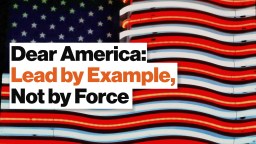The Unblinking Realities of Afghanistan

Bob Herbert gets it right in this morning’s New York Times: “President Obama is in the uncomfortable position of staring reality in the face in Afghanistan. Reality is not blinking.”
The top U.S. commander in Afghanistan is warning that America’s mission “will likely result in failure” unless he gets many more troops within the next year. Gen. Stanley A. McChrystal’s confidential assessment leaked out Sunday night.
A redacted version of the report can be seen here.
The report, with its cautions against avoiding “an outcome where defeating the insurgency is no longer possible,” is this week’s version of Afghanistan’s unblinking truth.
When I try to wrap my mind around the unblinking truth of Afghanistan, my thoughts inevitably drift back to the most discouraging words I ever heard about America’s mission there. Each time, I need to remind myself that the words came from a fundamentally upbeat, can-do speech by a former U.S. ambassador to Afghanistan, Ronald Neumann. What stopped me cold in that 2007 speech was Neumann’s talk about the need to create a tax base to fund the Afghan government:
“Until you create an industrial sector, you haven’t got anything to tax. And, you know, you’re not going to go with an AK in one hand and a tin cup in the other and tax the farmer. So you’re going to have to create something that’s taxable, but to get there you have to create a regulatory structure, and we’re doing that.”
Create a regulatory structure. Create an industrial sector. Defeat an insurgency. It’s a daunting to-do list. But it doesn’t mean America gets to give up and walk away.
This month, a Council on Foreign Relations podcast summed up the coming debate like this:
“The real question here is a duel of historical analogies. Half the people are worried about another 9/11 and therefore they don’t want to leave Afghanistan for fear that the bad guys will come back and launch another attack. And the other half are afraid of getting trapped in another Vietnam. And the sad part is both sides have a lot to worry about.”





